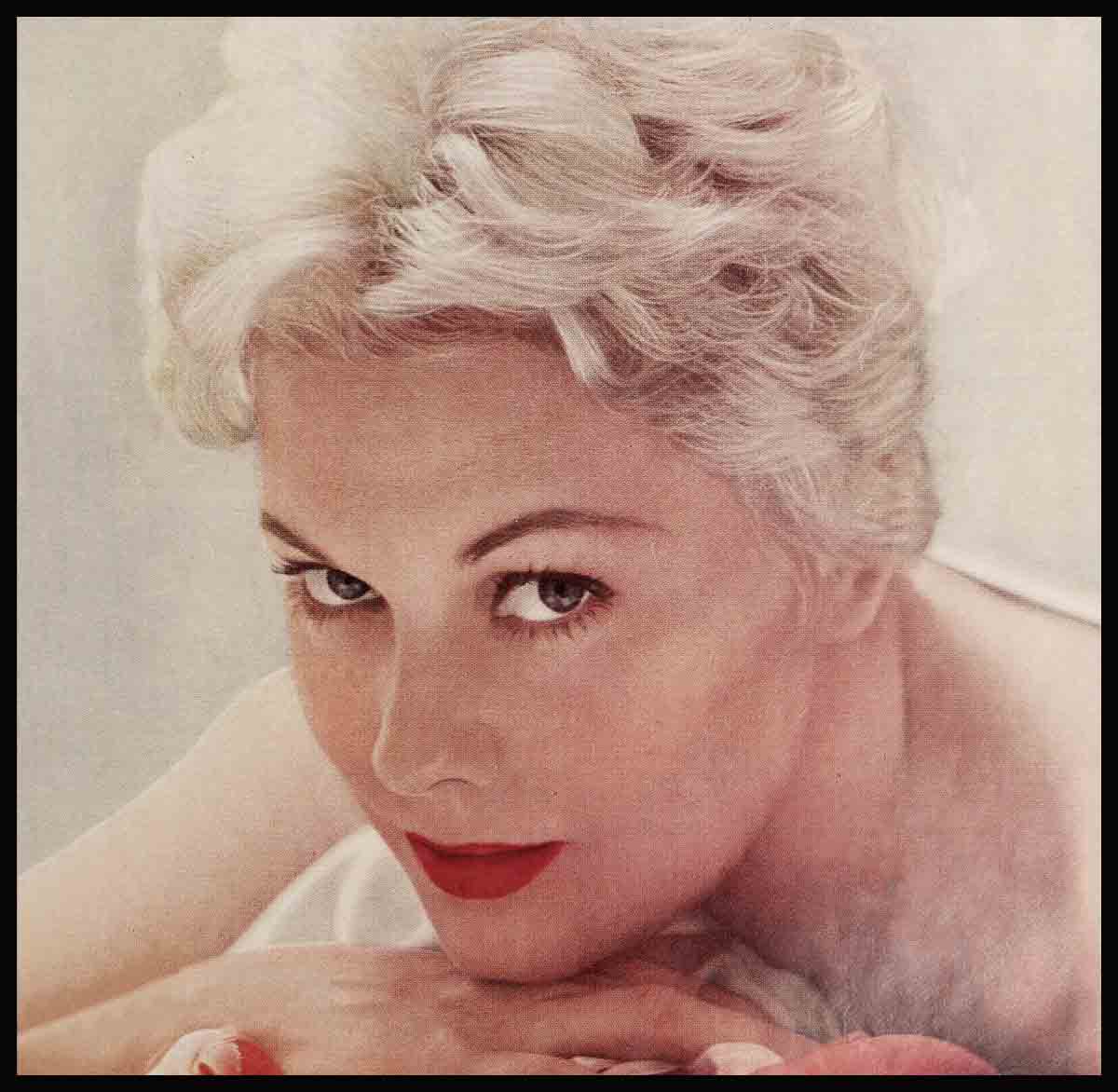
Kim Novak’s Dilemma
Love or career? It’s an eternal problem. Every woman has thought about it and every woman thinks she knows the answer. Love—of course. Only sometimes it isn’t that easy. Even for a woman deeply, dreamily in love—sometimes it can’t be answered that fast. For sometimes there are childhood dreams which call out an answer other than love, honest. loyalties that say—remember who you will hurt if you choose your love. On the next pages there is a very special story about Kim Novak. It is there to give you all the facts about the choice she must make now. And I think that when you have read it, you will see how hard a decision it is to make. You may even change your mind about your answer. So read it carefully. Because whatever your decision, you can help Kim. When you know all the facts, you can turn yourself for a little while into Kim Novak—and you can make up your mind. When you have done that, write to her, in care of MODERN SCREEN, Box 125, Murray Hill Station, New York City. Give her your answer. Every letter will go to her. The best one will be published in MODERN SCREEN, and the writer will get a $100 Savings Bond. But please—don’t write your letter to win the Bond. Write it to help Kim, because she needs you. Write to her now and say, “Kim—if I were you. . . .”
Editor Chuck Saxon
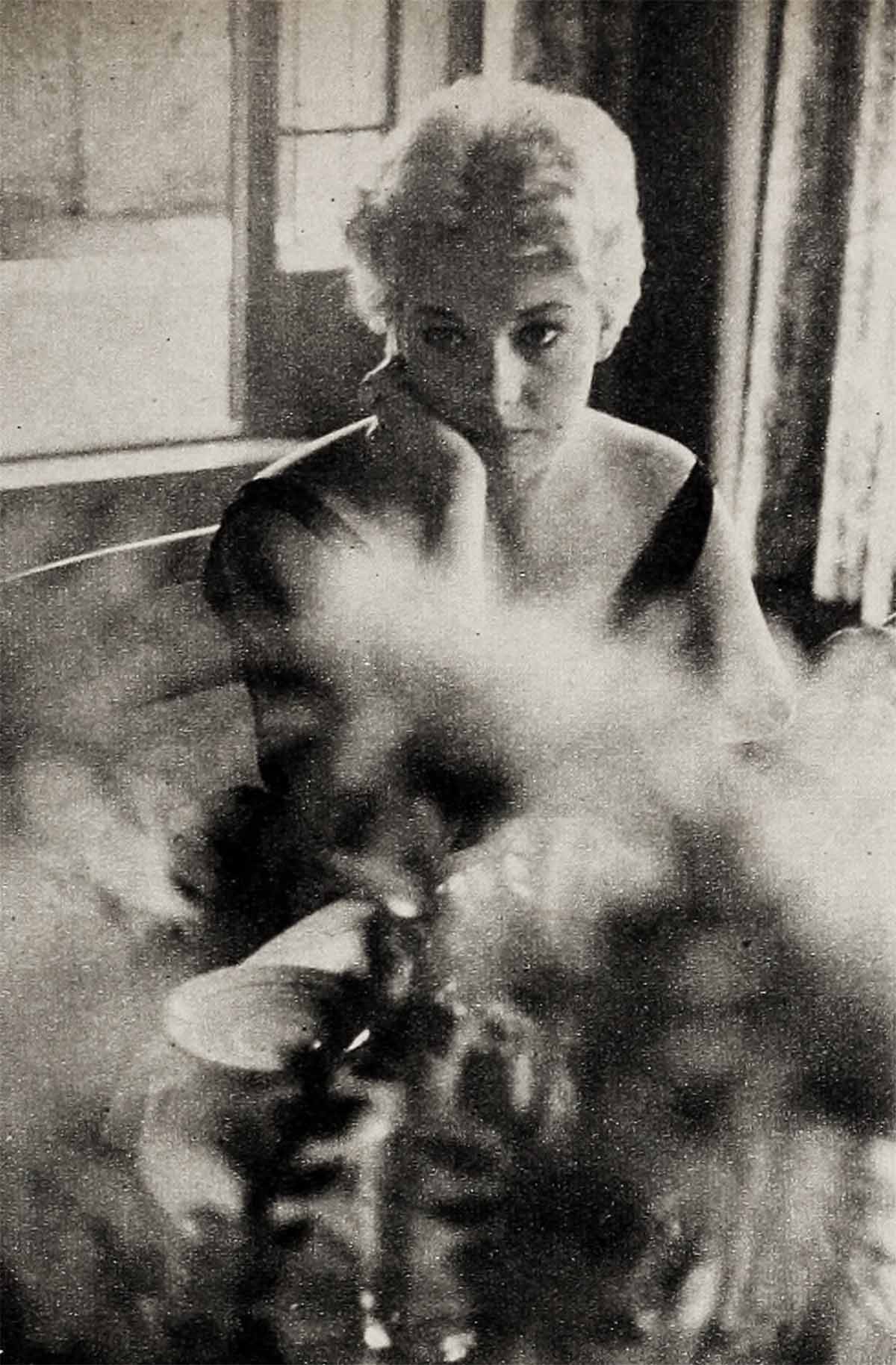
A few months ago, Kim Novak went home to Chicago. Her mother met her at the railroad station and took her home, strangely silent all the way. Kim asked about her sister, who is pregnant, gossiped about the girls her mother had met in Hollywood, questioned her about the house, her health—everything she could think of. She got one-word answers, and an absent look.
At home, Kim changed into a sweater and skirt and went downstairs. Her mother was in the kitchen, sitting at the table, stirring a cup of tea. Kim sat down opposite her and waited. Mrs. Novak added sugar, then milk. Finally she said, “What’s your next picture?”
“I don’t know yet,” Kim said, “we were so rushed on the last three nobody’s had a minute to think about the next.”
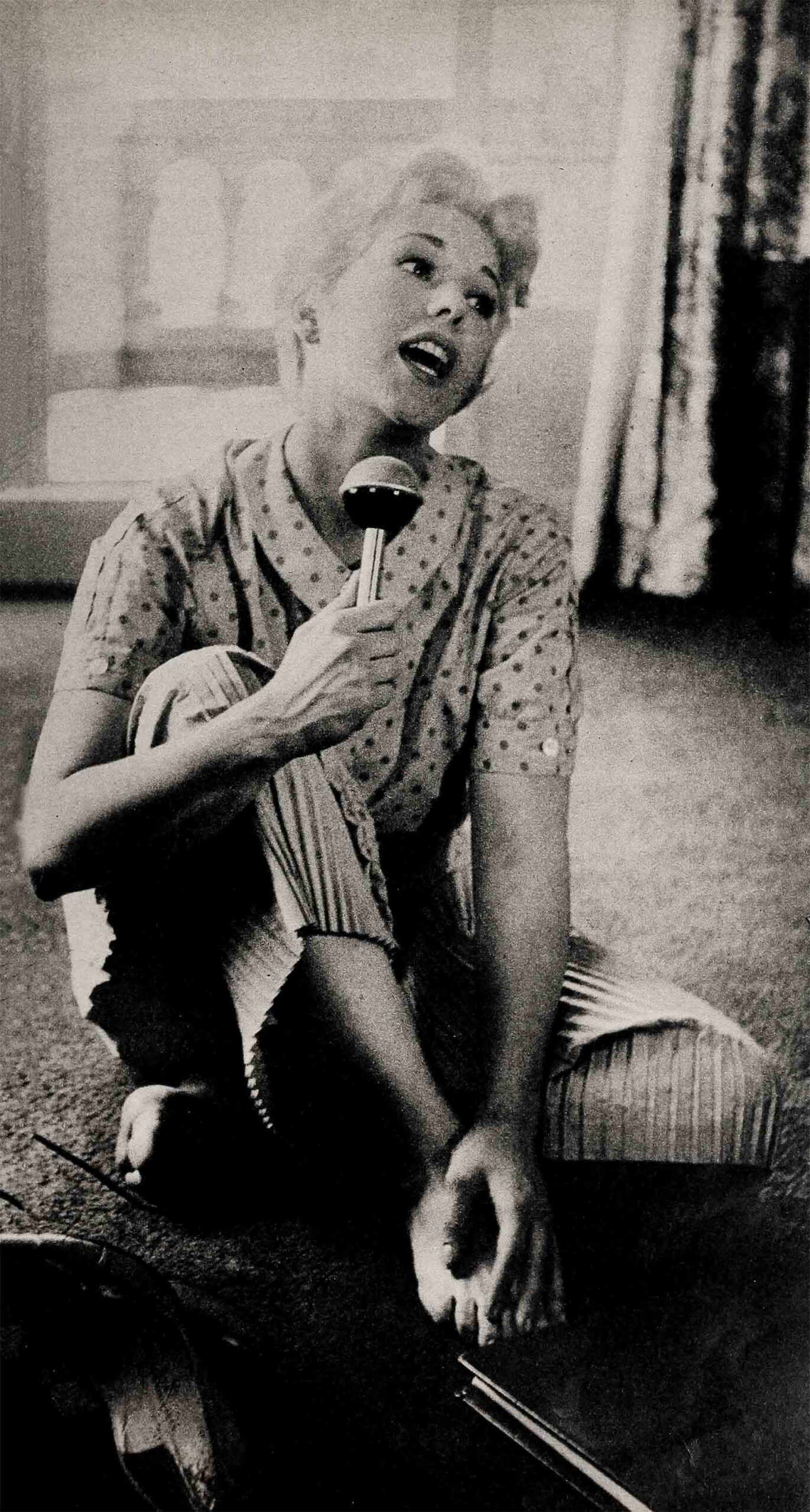
Working on her lines, studying constantly, Kim lives in her dream of being a really good actress—but if she marries, she may never make it.
“Um-hum,” said Mrs. Novak, still stirring. “Well, if they have no new picture for you, maybe you better find yourself a husband, huh? Someone who is a nice person.” She put down her spoon and looked straight at her daughter. “And soon!” she said.
That was the first time, but it wasn’t the last. It’s been that way ever since, every time Kim goes home. By now she has a set of stock answers. “Suits me,” she tells her mother. “Marriage it is.” Her mother grunts, unconvinced and thinks about it some more. Eventually Kim gets in her second word. “Of course I’ve got to be sure I’ve found the right man . . . and that he’s found me.” Her mother glances sideways at her and goes on talking. And never once does she mention the name of Mac Krim.
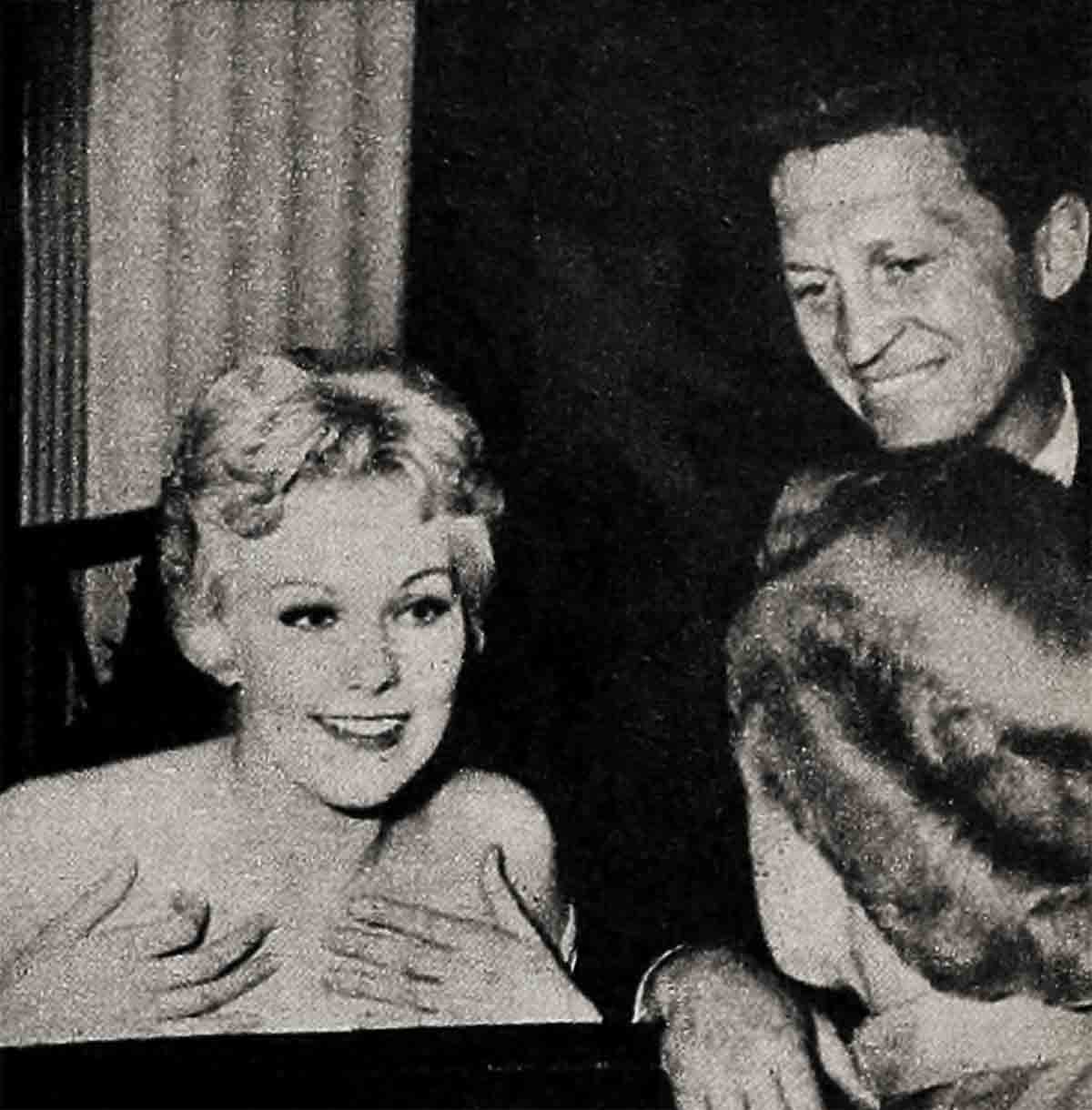
Mac Krim is the only person who makes her “feel like a woman,” conquers her shyness. She loves him deeply—but doesn’t know how long he’ll wait.
But, she doesn’t have to. Both Kim and Mrs. Novak know that the conversation is really about Mac. Both of them know that Mrs. Novak met him in Hollywood and liked him.
And both of them know that however many other men Kim may date, when she thinks of marriage, she thinks of Mac.
In a funny way, too—the more she dates, the more she knows the reason is Mac. Because if she didn’t go out with other men, if she spent all her time, as she used to and as she still longs to, with Mac Krim—she’d marry him. She’d have to, because she loves him too much to do anything else. The other dates are a desperate kind of escape from him, and from the questions she can’t answer.
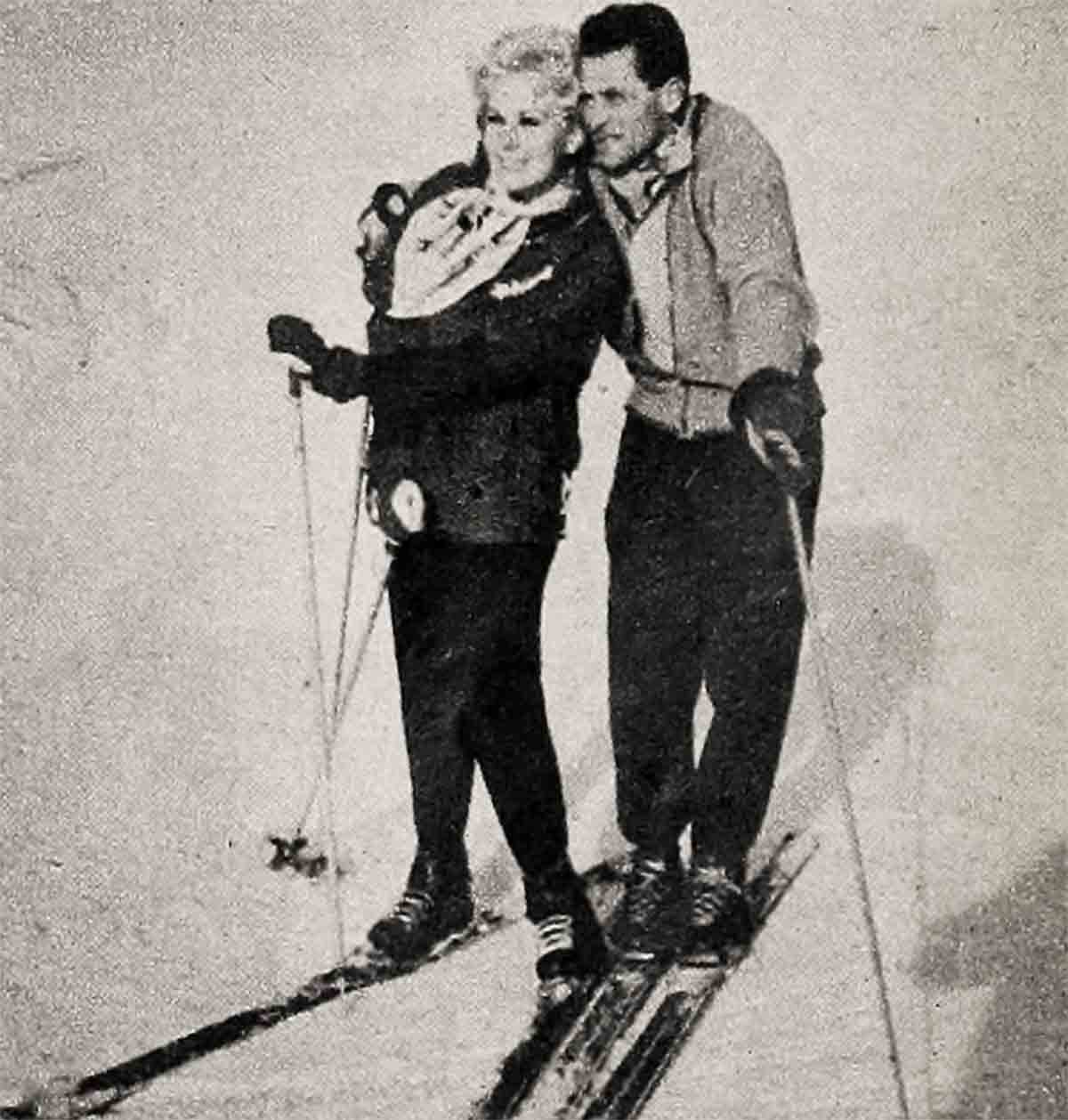
Tony Kastner, whom she met skiing, is a frequent date—but Kim’s friends say he’s not a new love—only an escape from the old one.
The guys she dates sense that, too. They aren’t exactly insulted, because it is quite an honor to be picked by Kim Novak even as An Escape. But they don’t let themselves fall for her, not if they can help it. They go right on seeing other women, too. The columnists, of course, have a field day with their other dates—hinting that Frank Sinatra is Kim’s new flame—but she isn’t his. And the skiing instructor she met at Grossinger’s and dated in New York, Tony Kastner—obviously, they say, he was doing her dirt. Why, she dated him in Europe, even at the Cannes Film Festival—and then the minute she left he took a plane for Chicago to see Cleo Moore! Why, the scoundrel. Poor Kim.
But if poor Kim felt sorry for herself, it had nothing to do with Tony’s dating Cleo. Ruefully, she hoped they’d have a good time. For herself—the thing that bothered her was that she just couldn’t seem to care.
Mac Krim’s competition was and is nothing so tangible as Another Man. And nothing so easy to beat.
Kim sat in a coffee shop with a girl friend one day recently—a girl of her own age, to whom she could talk almost more freely than she could to her mother. And she said, dreamily, “A happy marriage . . . that’s for me.” Her friend looked up, startled. But almost in the same breath Kim added, “Still, Mr. Cohn has been awfully good to me.”
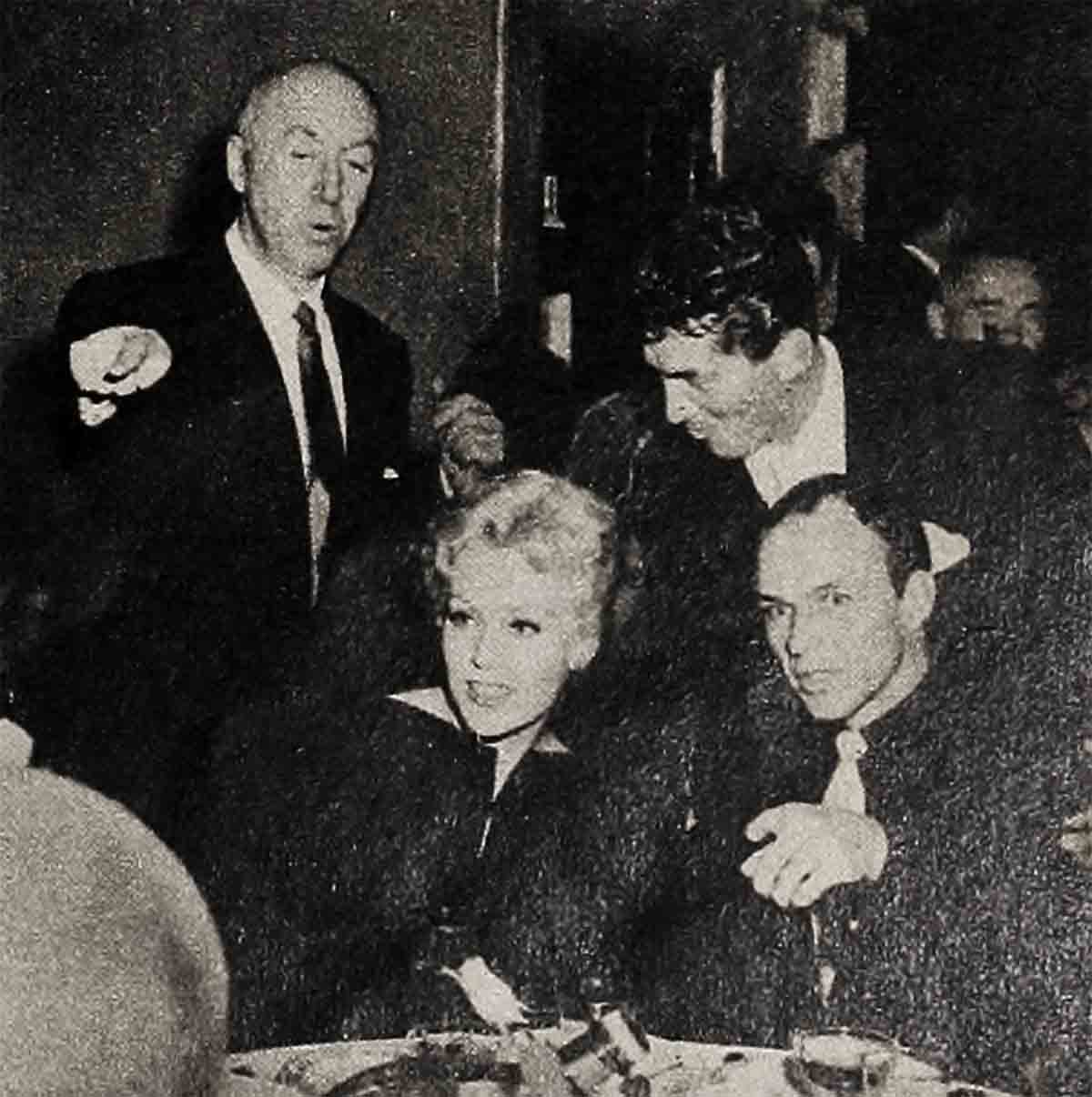
Being a star is not as important to Kim as acting—but it means excitement, knowing people like Sinatra, Martin. If she marries—will she have to give it up?
No—that’s not a new romantic angle. Harry Cohn, to Kim and the rest of the movie world, means Columbia Pictures, of which he is the head. She might have said “Maxwell Arnow” instead of “Mr. Cohn,” for Maxwell was also good to Kim, being the talent head of Columbia. To Kim he was the man with the magic touch who guided her career. She wept bitterly when he left Columbia for Hecht-Lancaster. She felt almost deserted then. But now she sat in the coffee house, twisting a ring on her finger. It was a gold signet ring, a present from Mac, and she wore it on her right hand. Suddenly she leaned forward. “Listen,” she said, a note of almost desperate urgency in her voice, “I know this is a dangerous time for me. I’m trying not to change in the important ways, but I may be on the point of giving up one life for another. Mac is very understanding about my career, but how long can a man be patient with a girl?”
“I don’t know, Kim,” her friend said.
Kim shook her head. “I’m so confused right now. I’m still in love with Mac—I know that for sure. But all of a sudden I really care about being a good actress. I keep feeling I want to give all my time to study—and to working toward that.
“Oh, it’s not that I’m really impressed with all this talk about stardom, and the fuss every one makes. That’s fun, and it’s nice—but it’s the acting I want. All of a sudden I can’t just sit back and let good enough be enough. I want to be good. And if you decide that, you’ve got to go all the way.”
And all the way is a long, lonely road to travel.
Kim Novak is a star, to be sure. At Columbia, she’s the reigning princess. But her position is not so secure that her throne can’t shaken—and at Columbia they keep telling her that if she gets married—it will topple.
Nobody, they told Kim, wants a married star. Partly because it’s not so glamorous. The fans don’t like it. It’s romantic if she’s in love, but it’s dull if she’s married.
But that’s not the only reason. “You’ll lose your ambition,” they told her. “How can you work, really give everything, when you know you’ve got a home to look after, and a meal to fix? When you’re worrying about your husband half the day? You’ll see—you just won’t care any more. And then—”
“But that won’t happen,” Kim pled. “It isn’t just ambition—it’s more. It’s a dream with me. I’ve told you how much I want to act. Don’t you see?”
“Sure, Kim. Maybe you’ll get a maid and a cook to fix dinner for your husband. And if you can keep from feeling guilty, maybe you’ll get by. But Kim—what if you have a baby? What do you do then—turn it over to a nurse to bring up?”
Kim shook her head slowly. “Oh, no. . . I couldn’t do that. . . .”
“Of course you couldn’t. So what then? One picture a year? You’re not ready for that, honey. And what if your husband had to move away from Hollywood—what if his business took him somewhere else? Would you let him go alone? Or would you go, too? And if you let him go alone—what good would you be here?”
“I don’t know. . . .”
“Well, we know. We’re older, and we’ve been around a long time. And honey, the truth is—if you get married, you’re not the only one who won’t be so interested in you any more. We love you—but we won’t be so interested. We can’t afford to be. If you’ve really got. a dream, Kim—make sure you don’t wake up out in the cold.”
Memories
“All the way,” Kim had said. Her friend sat quietly, studying her for a minute. She remembered the time when Kim had been on location for Picnic, and had written her half a dozen times, saying frankly, without even being em “Call Mac for me. Tell him I wrote you and said I was thinking about Mac. Tell him—tell him not to forget me.” And she remembered the night Kim had burst into her room in the Studio Club and wept a damp puddle into her pillow, because it was two whole days since she’d been back and Mac hadn’t phoned. And how she couldn’t be comforted until one of the sympathetic girls had sneaked down the hall and phoned Mac, and he’d phoned Kim to say he only wanted to give her a chance to rest before he “bothered” her. She remembered what Nick Adams had told her when she had asked. how Kim had been on location. “When she wasn’t working,” Nick had said, “she was almost always by herself. And when she was working—it was as if she loved it because it kept her mind off things.”
And so she sat there and looked at her friend, Kim Novak, the movie star, and reflected that she didn’t envy her one little bit. And finally, when she spoke, she said, “And after you’ve gone all the way, Kim—where will you be?”
Kim’s lips quivered, and for a moment she looked as if she’d burst into tears. “Oh, I know,” she said softly. “The men in the studio have done wonders for me as an actress—but Mac—Mac knew me before I was anybody. Mac has given me—faith, and confidence in myself as a woman.”
Her deep eyes filled with tears. “Tell me,” she said. “Tell me what I should do.”
But no one in Hollywood can tell Kim what to do. Partly because her friends are too close to it, the studio too involved with it. Mac Krim cannot tell her, cannot legitimately say more than he already has told others—“She’s a genuinely sweet girl. And she’s honest. I’ve never gone with a girl this long before.” He can’t make up her mind for her. The decision must be Kim’s. At the present, too confused to know just what she thinks, she needs advice from people who can look at her and at her problem clearly, without prejudice, without having an axe to grind.
She laughs when people talk about brides and marrying young—but nervously she adds, “Goodness—I’m twenty-three.” And it scares her, to be twenty-three and no nearer marriage—or even a decision—than she was when she was twenty. She does need advice—and soon.
THE END
—BY SUSAN WENDER
It is a quote. MODERN SCREEN MAGAZINE JULY 1956




